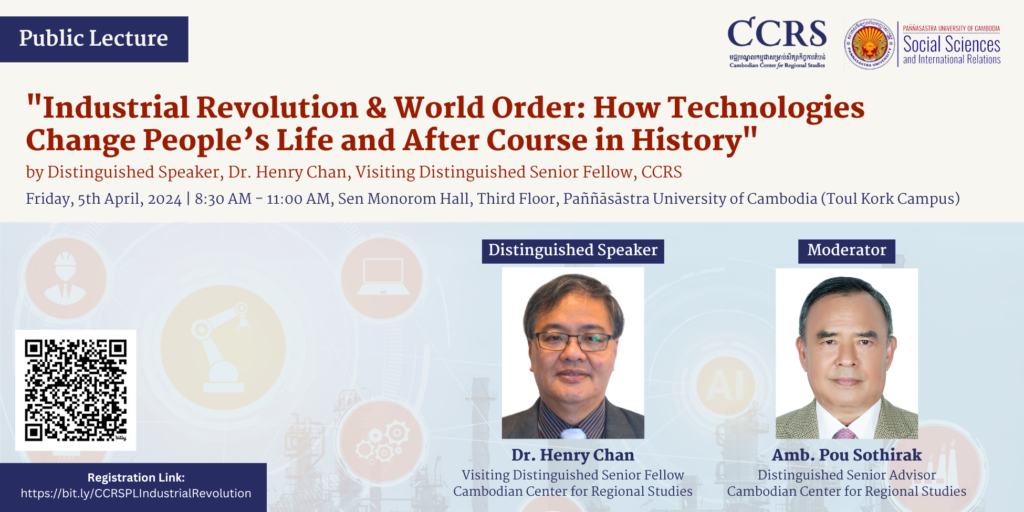The Cambodian Center for Regional Studies (CCRS) will organize Public Lecture on “Industrial Revolution & World Order: How Technologies Change People’s Life and After Course in History”, by Distinguished Speaker, Dr. Henry Chan, Distinguished Visiting Senior Fellow, CCRS, on Friday, 5 April 2024, Sen Monorom Hall, Third Floor, Paññāsāstra University of Cambodia (Toul Kork Campus).
The event is supported by Paññāsāstra University of Cambodia’s Faculty of Social Sciences and International Relations.
To secure your seat, please register via this link: https://bit.ly/CCRSPLIndustrialRevolution
Synopsis:
There is no denying the transformative power of technological innovation in shaping the economy and enhancing people’s lives. While innovation is a continuous process, pivotal moments occur when many new General-Purpose Technologies (GPTs) emerge, marking the onset of an Industrial Revolution. GPTs are distinguished by their exceptional utility value and low adaptation costs to different products or industries. As a result, their impact on the economy and society is amplified, surpassing that of other technologies.
The outstanding GPTs of the First Industrial Revolution (1770s-1860s) are steam engine and textile technologies. The second Industrial Revolution GPT are electricity and chemicals, while the third brought us the digital age. The ongoing 4th Industrial Revolution already saw the ascendancy of artificial intelligence and robotics and promised to be more disruptive than earlier industrial revolutions as these technologies have a faster speed of adoption and brought human-level intelligence to fill the human-machine gap. The list of new technologies associated with each industrial revolution is many and almost impossible to enumerate. Still, one thing is for sure: they are disruptive and whether a society ends up winner or loser depends on the collective efforts of the people.
The Industrial Revolution is also a period of pecking order adjustment in international relations. Pax Britannica came because of the 1st Industrial Revolution, while Pax Americana and Germany’s ascendancy were the hallmarks of the 2nd Industrial Revolution. The digital revolution of the 1980s brought American dominance back. Now, in the 4th Industrial Revolution, how the pecking order is redefined is probably the burning question on every geopolitical analyst’s mind.
The presentation will attempt to present the speaker’s idea on the topic “Industrial Revolution & World Order: How Technologies Change People’s Life and After Course in History.” It is by no means definitive nor authoritative. The speaker wishes the audience to start looking at what society should do to harness the potential in the ongoing 4th Industrial Revolution and minimize the unavoidable pitfalls associated with great technology adoption.
| Program | |
|---|---|
| 8:30 – 9:00 AM | Registration |
| 9:00 – 9:05 AM | Welcoming Remarks by Mr. Him Raksmey, Executive Director, CCRS |
| 9:05 – 9:10 AM | Group Photograph |
| 9:10 – 10:20 AM | Public Lecture on “Industrial Revolution & World Order: How Technologies Change People’s Life and After Course in History” by Distinguished Speaker, Dr. Henry Chan, Distinguished Visiting Senior Fellow, CCRS |
| 10:20 – 10:30 AM | Closing Remarks by Amb. Pou Sothirak, Distinguished Senior Advisor, CCRS |
| 10:30 – 11:00 AM | Refreshment and End of Public Lecture |
About the Role Players:
Dr Henry Chan received his BS in Electrical Engineering from the University of the Philippines, MSc in Biopharmaceuticals from the University of New South Wales, and PhD in General Management from Singapore Management University. Dr Chan is a businessman turned academic and a Visiting Distinguished Senior Fellow at the Cambodian Center for Regional Studies. Dr Chan’s diverse business and academic background allows him to work on multiple research areas ranging from ‘Climate Change’ to ‘Digital Transformation’ to ‘Great Power Transition’. His latest research interest is Chinese economic transformation in the era of the 4th Industrial Revolution.
Ambassador Pou Sothirak is a retired academic currently serving as the Distinguished Senior Advisor to the Cambodian Center for Regional Studies (CCRS). He was the Executive Director of the Cambodian Institute for Cooperation and Peace from May 2013 to August 2023. He was appointed as Secretary of State of the Ministry of Foreign Affairs and International Cooperation of Cambodia from September 2013 to January 2014. He was a Visiting Senior Research Fellow at the Institute of the Southeast Asian Studies (ISEAS) in Singapore from January 2009 to December 2012. He also served as Cambodian Ambassador to Japan from April 2005 to November 2008. He was elected Cambodian Member of Parliaments twice during the national general election in 1993 and 2003. He was appointed as Minister of Industry Mines and Energy of the Royal Government of Cambodia from 1993 to 1998. He has written extensively on various issues concerning the development of Cambodia and the region.

